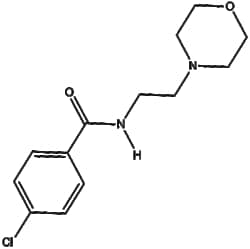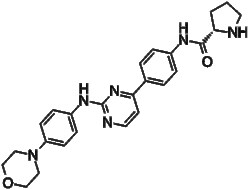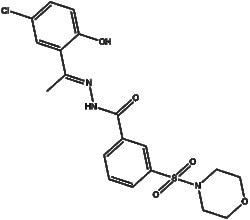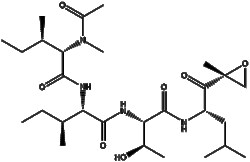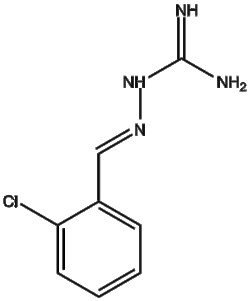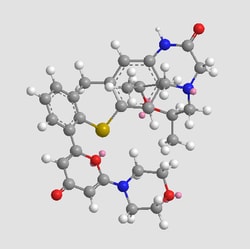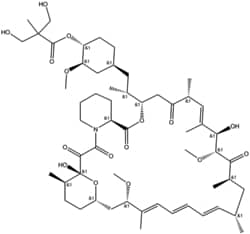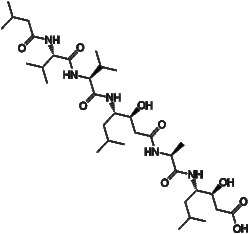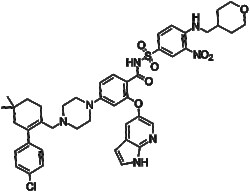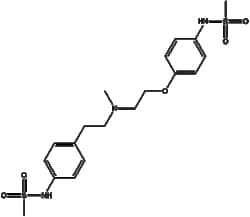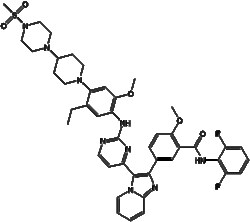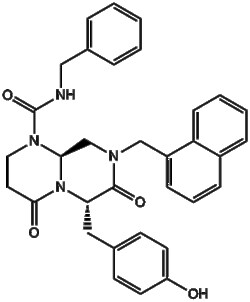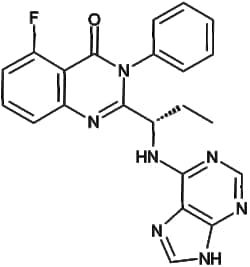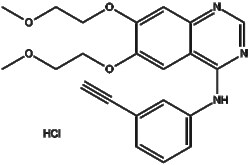
Dimethyl Sulfoxide
- (2)
- (2)
- (33)
- (1)
- (1)
- (1)
- (1)
- (1)
- (1)
- (1)
- (1)
- (18)
- (2)
- (1)
- (14)
- (1)
- (1)
- (2)
- (2)
- (1)
- (5)
- (1)
- (1)
- (18)
- (4)
- (1)
- (7)
- (2)
- (2)
- (1)
- (19)
- (7)
- (2)
- (1)
- (1)
- (1)
- (1)
- (2)
- (144)
- (1)
- (1)
- (2)
- (1)
- (68)
- (1)
- (1)
- (28)
- (1)
- (1)
- (1)
- (9)
- (2)
- (6)
- (11)
- (11)
- (2)
- (17)
- (8)
- (2)
- (2)
- (2)
- (1)
- (1)
- (1)
- (1)
- (2)
- (5)
- (5)
- (2)
- (4)
- (1)
- (1)
- (9)
- (12)
- (3)
- (2)
- (2)
- (4)
- (1)
- (6)
- (6)
- (1)
- (3)
- (4)
- (4)
- (1)
- (9)
- (1)
- (2)
- (3)
- (1)
- (5)
- (1)
- (3)
- (3)
- (2)
- (4)
- (2)
Filtered Search Results
Apexbio Technology LLC Moclobemide (Ro 111163) 71320-77-9 10mM (in 1mL DMSO)
 Small and Specialty Supplier Partner
Small and Specialty Supplier Partner
Small and/or specialty supplier based on Federal laws and SBA requirements.
Learn More

Small and/or specialty supplier based on Federal laws and SBA requirements.
Learn More
Moclobemide (Ro 111163 CAS 71320-77-9) is a reversible inhibitor of monoamine oxidase A (MAO-A) with a reported IC50 of approximately 10 M In vitro studies using rat brain homogenate indicate that it selectively targets MAO-A over MAO-B though with moderate potency Animal experiments demonstrate up to 80% inhibition of MAO-A activity in brain and liver tissues upon administration Prolonged high-dose exposure to Moclobemide alters adrenergic receptor profiles by downregulating -adrenergic receptors and enhancing affinity of 1-adrenergic agonist binding Due to its MAO-A specificity this compound serves as a prototype reversible inhibitor (RIMA) with relevance in antidepressant drug research

Non-distribution item offered as a customer accommodation; additional freight charges may apply.
Learn More
Apexbio Technology LLC XL019 945755-56-6 10mM (in 1mL DMSO)
 Small and Specialty Supplier Partner
Small and Specialty Supplier Partner
Small and/or specialty supplier based on Federal laws and SBA requirements.
Learn More

Small and/or specialty supplier based on Federal laws and SBA requirements.
Learn More
XL019 (CAS 945755-56-6) is a selective inhibitor targeting Janus kinase 2 (JAK2) with an IC50 of 2 2 nM JAK2 regulates signaling pathways controlling erythroid granulocytic and megakaryocytic lineage differentiation via cytokine and hematopoietic growth factor receptors including erythropoietin and thrombopoietin receptors XL019 demonstrates high selectivity for JAK2 over related kinases (e g JAK1 TYK2) In mouse models bearing HEL 92 1 7 xenografts oral administration of XL019 significantly reduced tumor growth XL019 is evaluated clinically as a candidate for treating primary myelofibrosis and secondary myelofibrosis associated with polycythemia vera or essential thrombocythemia

Non-distribution item offered as a customer accommodation; additional freight charges may apply.
Learn More
Apexbio Technology LLC SP2509 1423715-09-6 10mM (in 1mL DMSO)
 Small and Specialty Supplier Partner
Small and Specialty Supplier Partner
Small and/or specialty supplier based on Federal laws and SBA requirements.
Learn More

Small and/or specialty supplier based on Federal laws and SBA requirements.
Learn More
SP2509 (CAS 1423715-09-6) is a small molecule antagonist of lysine-specific demethylase 1 (LSD1/KDM1A) a histone-modifying enzyme responsible for demethylating mono- and dimethylated histone H3 lysine 4 (H3K4) SP2509 potently inhibits LSD1 activity (IC50 13 nM) without affecting monoamine oxidase isoforms MAO-A or MAO-B In acute myeloid leukemia (AML) cells SP2509 suppresses LSD1 function reduces colony formation induces apoptosis enhances promoter-specific H3K4 trimethylation and stimulates differentiation through upregulation of p53 p21 and C/EBP Its efficacy has been demonstrated in AML xenograft models supporting its utility as a tool compound for cancer research

Non-distribution item offered as a customer accommodation; additional freight charges may apply.
Learn More
Apexbio Technology LLC Epoxomicin 134381-21-8 10mM (in 1mL DMSO)
 Small and Specialty Supplier Partner
Small and Specialty Supplier Partner
Small and/or specialty supplier based on Federal laws and SBA requirements.
Learn More

Small and/or specialty supplier based on Federal laws and SBA requirements.
Learn More
Epoxomicin (CAS 134381-21-8) is a naturally occurring proteasome inhibitor initially isolated from actinomycete cultures It acts primarily by forming covalent bonds through its -epoxyketone moiety with catalytic residues of the proteasome resulting in potent inhibition of the chymotrypsin-like (CTRL) activity of the 20S proteasome subunit Epoxomicin also inhibits proteasomal trypsin-like and peptidyl-glutamyl peptide hydrolysis activities albeit at significantly lower rates It exhibits anti-inflammatory and antitumor activities and is employed experimentally to study ubiquitin-proteasome-mediated cellular pathways bone formation regulation and Parkinson s disease model generation

Non-distribution item offered as a customer accommodation; additional freight charges may apply.
Learn More
Apexbio Technology LLC Sephin1 13098-73-2 10mM (in 1mL DMSO)
 Small and Specialty Supplier Partner
Small and Specialty Supplier Partner
Small and/or specialty supplier based on Federal laws and SBA requirements.
Learn More

Small and/or specialty supplier based on Federal laws and SBA requirements.
Learn More
Sephin1 (CAS 13098-73-2) is a selective inhibitor of PPP1R15A a regulatory subunit of protein phosphatase 1 involved in the regulation of stress-induced eIF2 dephosphorylation Under endoplasmic reticulum (ER) stress phosphorylated eIF2 attenuates protein synthesis preventing accumulation of misfolded proteins By inhibiting PPP1R15A Sephin1 sustains eIF2 phosphorylation extending translational attenuation during ER stress In cell assays Sephin1 selectively disrupts PPP1R15A-PP1c complexes without affecting PPP1R15B-mediated complexes In mouse models harboring misfolded protein mutations (e g MPZ or SOD1) Sephin1 administration mitigates molecular cellular and functional deficits thus relevant for proteostasis-related disease studies

Non-distribution item offered as a customer accommodation; additional freight charges may apply.
Learn More
Apexbio Technology LLC Proparacaine HCl 5875-06-9 10mM (in 1mL DMSO)
 Small and Specialty Supplier Partner
Small and Specialty Supplier Partner
Small and/or specialty supplier based on Federal laws and SBA requirements.
Learn More

Small and/or specialty supplier based on Federal laws and SBA requirements.
Learn More
Proparacaine HCl (CAS 5875-06-9) is a small-molecule antagonist of voltage-gated sodium channels By inhibiting sodium ion entry through these channels Proparacaine HCl effectively suppresses action potential generation and neuronal signaling Assays demonstrate an ED50 value of approximately 3 4 mM Due to its sodium channel inhibition Proparacaine HCl is utilized in scientific research to study neuronal excitability ion channel function and related electrophysiological processes

Non-distribution item offered as a customer accommodation; additional freight charges may apply.
Learn More
Apexbio Technology LLC KU-60019 925701-49-1 10mM (in 1mL DMSO)
 Small and Specialty Supplier Partner
Small and Specialty Supplier Partner
Small and/or specialty supplier based on Federal laws and SBA requirements.
Learn More

Small and/or specialty supplier based on Federal laws and SBA requirements.
Learn More
KU-60019 is a selective inhibitor targeting ataxia telangiectasia mutated (ATM) kinase with an IC50 value of approximately 6 3 nM Through inhibition of ATM kinase activity KU-60019 influences cellular DNA damage responses and sensitivity to radiation therapy It has been demonstrated to enhance radiosensitivity in human fibroblast cells expressing functional ATM but not in ATM-deficient cells Additionally KU-60019 reduces radiation-induced phosphorylation of AKT at Ser473 in glioma cell lines independently affecting cell migration invasion and proliferation KU-60019 serves as an investigational tool for exploring ATM-dependent signaling pathways and examining therapeutic strategies against cancers involving ATM-regulated DNA repair and cell survival mechanisms

Non-distribution item offered as a customer accommodation; additional freight charges may apply.
Learn More
Apexbio Technology LLC Temsirolimus 162635-04-3 10mM (in 1mL DMSO)
 Small and Specialty Supplier Partner
Small and Specialty Supplier Partner
Small and/or specialty supplier based on Federal laws and SBA requirements.
Learn More

Small and/or specialty supplier based on Federal laws and SBA requirements.
Learn More
Temsirolimus (CCI-779) is an ester analog of rapamycin functioning as an inhibitor of the mammalian target of rapamycin (mTOR) The compound suppresses mTOR signaling pathways thus inhibiting cellular proliferation and growth In preclinical studies on breast cancer cell lines Temsirolimus displayed inhibitory activities with reported IC50 values of 0 6 nM in BT-474 cells 0 7 nM in MDA-MB-468 and SKBR-3 cells and 50 nM in MCF-7 cells It has been examined in xenograft models of tumors with PTEN mutations and multiple myeloma for investigating pathways related to cell-cycle progression and proliferation regulated by mTOR

Non-distribution item offered as a customer accommodation; additional freight charges may apply.
Learn More
Apexbio Technology LLC Pepstatin A 26305-03-3 10mM (in 1mL DMSO)
 Small and Specialty Supplier Partner
Small and Specialty Supplier Partner
Small and/or specialty supplier based on Federal laws and SBA requirements.
Learn More

Small and/or specialty supplier based on Federal laws and SBA requirements.
Learn More
Pepstatin A is a pentapeptide functioning as an inhibitor targeting aspartic proteases including pepsin renin HIV protease and cathepsin D It inhibits human renin and HIV protease with IC50 values of approximately 15 M and 2 M respectively and shows inhibitory activity toward pepsin and cathepsin D at IC50 values below 5 M and 40 M Mechanistically Pepstatin A acts through binding to the catalytic site of aspartic proteases restricting proteolytic activity In biomedical research it is utilized to study viral protein processing osteoclast differentiation mediated by cathepsins and as a standard tool in enzyme inhibition assays examining aspartic protease function

Non-distribution item offered as a customer accommodation; additional freight charges may apply.
Learn More
Apexbio Technology LLC ABT-199 1257044-40-8 10mM (in 1mL DMSO)
 Small and Specialty Supplier Partner
Small and Specialty Supplier Partner
Small and/or specialty supplier based on Federal laws and SBA requirements.
Learn More

Small and/or specialty supplier based on Federal laws and SBA requirements.
Learn More
ABT-199 (CAS 1257044-40-8) is a selective small-molecule inhibitor targeting BCL-2 developed through structure-guided drug design By specifically interfering with the mitochondrial apoptotic pathway regulated by BCL-2 ABT-199 induces apoptosis predominately in cells dependent on BCL-2 signaling rather than BCL-XL In preclinical assessments ABT-199 exhibited antitumor activity against hematologic malignancies including BCL-2-dependent non-Hodgkin lymphoma (NHL) and acute myeloid leukemia (AML) cell lines and xenograft models while demonstrating minimal platelet toxicity

Non-distribution item offered as a customer accommodation; additional freight charges may apply.
Learn More
Apexbio Technology LLC Dofetilide 115256-11-6 10mM (in 1mL DMSO)
 Small and Specialty Supplier Partner
Small and Specialty Supplier Partner
Small and/or specialty supplier based on Federal laws and SBA requirements.
Learn More

Small and/or specialty supplier based on Federal laws and SBA requirements.
Learn More
Dofetilide (CAS 115256-11-6) chemically designated as UK 68789 is a class III antiarrhythmic small molecule that selectively inhibits the rapid delayed rectifier potassium channel (IKr) This inhibition leads to prolonged ventricular action potential duration and extended effective refractory periods in cardiac cells Noted for favorable oral bioavailability Dofetilide is extensively utilized in cardiac electrophysiological research including studies aimed at elucidating arrhythmogenic mechanisms linked to IKr channel function assessing novel antiarrhythmic candidates and exploring physiological and pathological aspects of cardiac rhythm regulation

Non-distribution item offered as a customer accommodation; additional freight charges may apply.
Learn More
Apexbio Technology LLC GSK1904529A 1089283-49-7 10mM (in 1mL DMSO)
 Small and Specialty Supplier Partner
Small and Specialty Supplier Partner
Small and/or specialty supplier based on Federal laws and SBA requirements.
Learn More

Small and/or specialty supplier based on Federal laws and SBA requirements.
Learn More
GSK1904529A (CAS 1089283-49-7) is a small-molecule inhibitor targeting insulin-like growth factor-I receptor (IGF-1R) Mechanistically it acts as a reversible ATP-competitive antagonist inhibiting IGF-1R kinase activity with an IC50 of approximately 27 nM and a Ki value of 1 6 nM In NIH-3T3/LISN cells it reduces IGF-1R phosphorylation at an IC50 of about 22 nM subsequently attenuating phosphorylation of downstream effectors such as AKT IRS-1 and ERK pathways GSK1904529A also suppresses proliferation in various tumor cell lines through cell-cycle arrest at the G1 phase and demonstrates tumor growth inhibition in xenograft mouse models It serves as a research tool for investigating IGF-1R signaling in oncology

Non-distribution item offered as a customer accommodation; additional freight charges may apply.
Learn More
Apexbio Technology LLC ICG 001 847591-62-2 10mM (in 1mL DMSO)
 Small and Specialty Supplier Partner
Small and Specialty Supplier Partner
Small and/or specialty supplier based on Federal laws and SBA requirements.
Learn More

Small and/or specialty supplier based on Federal laws and SBA requirements.
Learn More
ICG 001 is a small molecule inhibitor of the canonical Wnt/ -catenin signaling pathway Mechanistically it competes with -catenin for interaction with CREB-binding protein (CBP) thereby selectively disrupting CBP/ -catenin-mediated transcriptional activity driven by the TCF/ -catenin complex (IC50 3 M) Experimental studies demonstrated its use in assessing CBP-dependent biological functions regulated by Wnt signaling Research applications include investigating CBP/ -catenin roles in cancer cell proliferation such as colorectal cancer cells (HCT-116 SW480) glioblastoma stem cell growth and fibrotic responses in pulmonary and dermal experimental models Additionally ICG 001 is under evaluation in clinical studies aiming at treatment of colorectal cancer and leukemia

Non-distribution item offered as a customer accommodation; additional freight charges may apply.
Learn More
Apexbio Technology LLC CAL-101 (Idelalisib, GS-1101) 870281-82-6 10mM (in 1mL DMSO)
 Small and Specialty Supplier Partner
Small and Specialty Supplier Partner
Small and/or specialty supplier based on Federal laws and SBA requirements.
Learn More

Small and/or specialty supplier based on Federal laws and SBA requirements.
Learn More
CAL-101 (Idelalisib GS-1101 CAS 870281-82-6) is a selective inhibitor targeting the p110 isoform of phosphatidylinositol 3-kinase (PI3K) an enzyme involved in signaling pathways critical for proliferation and survival of malignant B cells By inhibiting PI3K p110 CAL-101 reduces PI3K-mediated phosphorylation of Akt and other downstream factors leading to enhanced PARP cleavage and caspase activation ultimately inducing apoptosis in malignant B cells CAL-101 has been demonstrated to counteract survival signals initiated by molecules such as CD40 ligand (CD40L) TNF- and fibronectin This agent is valuable in investigating B-cell malignancies

Non-distribution item offered as a customer accommodation; additional freight charges may apply.
Learn More
Apexbio Technology LLC Erlotinib Hydrochloride 183319-69-9 10mM (in 1mL DMSO)
 Small and Specialty Supplier Partner
Small and Specialty Supplier Partner
Small and/or specialty supplier based on Federal laws and SBA requirements.
Learn More

Small and/or specialty supplier based on Federal laws and SBA requirements.
Learn More
Erlotinib hydrochloride (CAS 183319-69-9) is a small molecule inhibitor targeting the epidermal growth factor receptor (EGFR/HER-1) specifically blocking its tyrosine kinase activity By competitively inhibiting EGFR phosphorylation (IC50 2 nM) Erlotinib hydrochloride disrupts downstream signaling pathways involved in tumor cell proliferation apoptosis resistance migration and angiogenesis In vitro studies indicate this inhibitor induces G0/G1 cell cycle arrest and promotes apoptosis in cancer cell lines such as pancreatic (Bxpc-3 PANC-1) and hepatocellular carcinoma cells Erlotinib hydrochloride is widely studied in oncology research particularly in non-small cell lung cancer (NSCLC) and pancreatic cancer models

Non-distribution item offered as a customer accommodation; additional freight charges may apply.
Learn More


